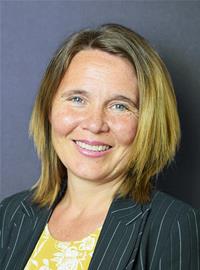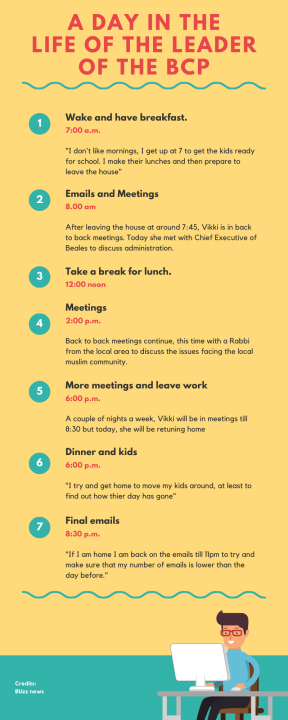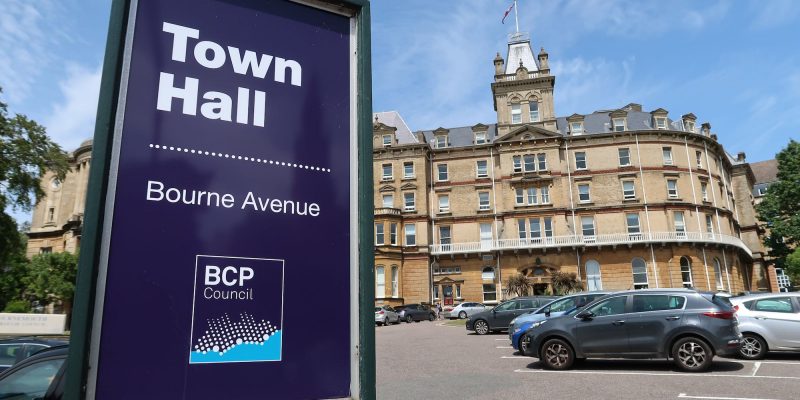In this exclusive interview, BCP leader Vikki Slade talks for the first time about the pressures of running the 12th largest unitary council in Britain – in light of a recent reporting warning spiralling costs of mental health to employers. Connor Stringer reports.
It’s Christmas eve and the sun has long set over a quiet residential avenue in Poole. Decorations light the neighbourhood as families retreat from the cooling night to the comfort of their homes, awaiting the festive formalities that will occur tomorrow. Except for one family. A concerned constituent knocks on the door of their council representative, eager to voice their concerns over a problem they had with their neighbour.
Vikki Slade has become accustomed to the late-night phone calls, emails and door knocking that comes with being the leader of the BCP. Having first ran as a councillor in 2001, she is well experienced in the craft of ward work, but even that couldn’t prepare her family for a knock on Christmas eve.
“Residents will knock on your door quite happily at nine o’clock at night or, a Saturday tea-time or expect you to respond to them on Christmas Eve,” she says.
“You’ve got your own family and you’ve got your own life but actually there is an expectation that you will drop everything you’re doing for whatever their issue might be and that takes a lot of getting used to and that takes a lot of tolerance from your family.”
She’s gathering her final belongings, preparing to leave the house for a three hours drive to her next meeting in Taunton.
“You’re seen as a public figure. It can be a little tough to deal with sometimes when you actually are just a family working on a budget trying to go about your daily business,” she explains.

Vikki was elected leader of the council in 2019 after the merger of Bournemouth, Poole and Christchurch boroughs in 2018 but her political career didn’t start there. The mother ran a catering business while being Chair of the local Chamber of Trade in 2001 when she was elected as Ward councillor for Broadstone.
“It’s incredibly stressful. Everybody else needs you when they’re having a stressful time and often people see the council as the cause of their stress. You are the obvious person for them to take it out on.
“You’re seen as a public figure. It can be a little tough to deal with sometimes when you’re actually just a family working on a budget trying to go about your daily business,” she says.
Unlike most provincial elections, municipal elections are usually held on a fixed date of four years, forcing councillors to make short-term life choices in the fear that they may lose their job.
Just last month, Labour’s longest-serving MP Dennis Skinner lost his seat to the Conservatives after holding the Bolsover seat for 49 years.
“You can’t make any decisions that are long term. When I first became a councillor, I realised that I’d need separate transport for my husband. We decided to buy a car, but knew I had to get it on a four-year loan because I might not get elected.
“I could go from an okay average local salary to nothing overnight,” she says.
Stress in the workplace:
A new analysis by Deloitte found that poor mental health is costing UK employers up to £45 billion each year. This is a rise of 16% since 2016 – an extra £6 billion a year.
It comes after a Mind survey found the UK public sector employs over 5.4 million people, almost 3 million of whom are employed by the Central Government alone. The survey found that public sector workers were over a third more likely to say their mental health was poor than their peers in the private sector and are far more likely to say they have felt anxious at work on several occasions over the last month.
Most people don’t have a job where every decision they make decides whether or not you keep it or not
Emma Mamo, Head of Workplace Wellbeing at Mind, explained the importance of investing in staff wellbeing. She said: “With issues like stress, anxiety and depression common, it’s important that every employer invests in staff wellbeing.
“Most of us will experience an element of pressure in our jobs every now and again, and in the short term, it can be beneficial, helping us to meet deadlines, for example. But long-term exposure to pressure can lead to stress.”
A day in the life:

It’s not just the leader feeling the pressure of 400,000 residents but other cabinet members too. Deputy Leader of BCP Council Mark Howell also expressed his concern over the level of stress members of the cabinet face.
“The position is a stressful one. It’s stressful because of the intensity of the work, emails and meetings you have to attend as a cabinet member.
“I don’t have a family which is convenient but for somebody who has children, I would think it would be very, very difficult to be a cabinet member and be able to spend time with children,” he said.
In a statement to BUzz news, BCP council said that welfare measure is in place if members need it but they could not confirm what those measures were.
They said: “We can confirm that should councillors need it, we have appropriate wellbeing and support provision in place for them.”
As Mrs Slade gathers her last belongings and makes her way to the car, expecting to be home by 8 pm, just in time to see her kids to bed. She reflects on the advice she was never offered at the beginning of her career.
“I’ve been trying to give some advice to new local councillors about actually not getting involved in the stuff you don’t need to get involved in.
“We’re all very good at getting stuck into things which actually don’t evolve us.”
“Most people don’t have a job where every decision they make decides whether or not you keep it or not,” she says.
BUzz: I bet you didn’t know that the leader of the BCP Council has this kind of daily routine!
Vikki Slade spoke to me today about her packed daily schedule and the pressures with being the public eye.
Do you think being a councillor would be a stressful job? pic.twitter.com/PBiMTojCJx
— Connor Stringer (@connor_stringer) January 31, 2020


 “This is something girls are entitled to”: What is the next step for free period products in Dorset schools?
“This is something girls are entitled to”: What is the next step for free period products in Dorset schools?